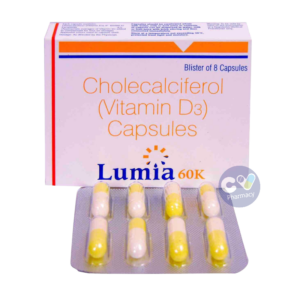VIT D3 + CHOLECALCIFEROL
Vit D3: Vitamin D3, also known as cholecalciferol, is a fat-soluble vitamin that helps regulate the levels of calcium and phosphate in the body. It is essential for maintaining healthy bones, teeth, and muscles.
The primary use of Vitamin D3 is to treat vitamin D deficiency or insufficiency. It is also prescribed to prevent and treat conditions such as osteoporosis, osteomalacia, rickets, and hypoparathyroidism. In some cases, it may be prescribed to treat certain kidney or liver disorders.
Vitamin D3 works by promoting the absorption of calcium and phosphate from the intestine and preventing excessive loss of calcium from the kidneys. It also stimulates the activation of osteoblasts, which are cells responsible for bone formation.
The recommended dose of Vitamin D3 can vary depending on the individual’s age, medical condition, and the severity of their vitamin D deficiency. Typically, adults are prescribed daily dosages ranging from 400 to 2000 international units (IU), although higher doses may be required in some cases. It is commonly available in tablet or capsule form.
While Vitamin D3 is generally safe, excessive intake can lead to vitamin D toxicity. Common side effects of high doses of Vitamin D3 include nausea, vomiting, constipation, loss of appetite, and increased thirst. Long-term excessive intake can also cause hypercalcemia (high levels of calcium in the blood), which may lead to kidney stones, bone pain, and muscle weakness.
It’s important to note that Vitamin D3 supplements should be taken under the guidance of a healthcare professional, as they can interact with certain medications and medical conditions. It is also advisable to get routine blood tests to monitor vitamin D levels and ensure proper supplementation.
Cholecalciferol: Cholecalciferol, also known as vitamin D3, is a medication classified as a vitamin supplement. It is used to treat or prevent vitamin D deficiency, as well as conditions associated with low levels of vitamin D such as rickets, osteoporosis, and certain types of bone disorders.
Cholecalciferol works by increasing the levels of vitamin D in the body. It acts as a prohormone and is converted into its active form, calcitriol, in the liver and kidneys. Calcitriol then helps in the absorption and regulation of calcium and phosphorus in the body, promoting healthy bone growth and maintenance.
The dose of cholecalciferol varies depending on the individual’s age, medical condition, and the purpose of treatment. Generally, for vitamin D deficiency, the recommended dose ranges from 800 to 2000 international units (IU) per day. Higher doses may be required for severe deficiencies or specific medical conditions. It is important to follow the instructions provided by a healthcare professional or the medication package.
As a supplement, cholecalciferol is generally well-tolerated. However, like any medication, it may have some side effects. Common side effects include nausea, vomiting, constipation, loss of appetite, increased thirst, and dry mouth. These side effects are generally mild and temporary. It is important to consult a healthcare professional if any severe or persistent side effects occur.
Cholecalciferol may interact with other medications, such as certain antacids, corticosteroids, and cholesterol-lowering drugs. It is important to inform the healthcare professional about all medications, supplements, and herbal products being taken to avoid potential interactions.
In summary, cholecalciferol is a medication used to treat or prevent vitamin D deficiency and associated conditions. It works by increasing vitamin D levels in the body, promoting proper absorption and regulation of calcium and phosphorus. The dose varies depending on the individual’s needs. Common side effects include nausea, vomiting, and constipation, but these are generally mild. It is important to speak with a healthcare professional for personalized advice and monitoring while taking cholecalciferol.

